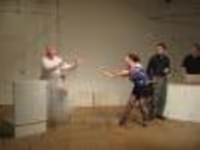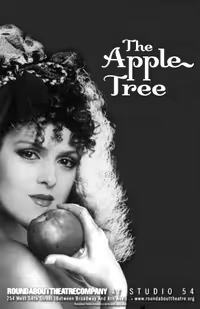Is This True???
#0Is This True???
Posted: 9/28/06 at 7:20pm
I am taking a Theatre Arts elective in school, and I swear at times I know more than the teacher (usually when it comes to musicals etc.)
She said the other day that ANY non-musical show is considered a drama. Even comedies can be called a drama. She said drama doesn't always mean a sad show, it just means a play with no music. Is that true? Because I previously didn't understand it like that.
And she is doing our Fall play. And I was wondering.. when amatures put on licensed plays, do you have to follow the stage directions? She said the stage directions were just written in there by the the original stage mananger of the original production. And they are just a guide to help us out, and to give us ideas. And basically we don't have to follow them all the way.
Just wondering if someone can give me some answers with those two questions. Thanks!
Updated On: 9/28/06 at 07:20 PM
#1re: Is This True???
Posted: 9/28/06 at 7:22pmShe's correct on both counts.
#2re: Is This True???
Posted: 9/28/06 at 7:23pmThank you! I wasn't exactly sure about those two things, and just wanted to make sure she was right.
theatredorkny
Swing Joined: 9/28/06
#3re: Is This True???
Posted: 9/28/06 at 7:30pmDrama is a general term used for any non-musical play. Always read the stage directions because while most of then were written in by the stage manager of the first production, some may have been written by the playright. There's an example in the book "Misdirecting the Play" which describes a situation where a director blacked out all stage directions before reading them, then wondered why one of the main characters suddenly stopped speaking during the last couple pages of the play. It turns out the character had been shot dead, however since the director had eliminated all stage directions he did not know this important piece of information.
#4re: Is This True???
Posted: 9/28/06 at 7:36pm
Thanks Rath--you are right!!! Of course, ignoring stage directions--some actually involve PLOT!, is silly.
Stage directions are usually to let the reader know what happens during the original production. However, many times the playwright has written specific directions that are outside of the dialogue. You have to read them and decide what you wish to use during your own production.
And yes, drama means play, musical means just that. Comedy is a distinction within the dramatic form. Musical comedy is unfortunate in its terminology. Doesn't always have to be funny: Just great theatre!
"Time flies like an arrow, fruit flies like a banana." GMarx
#5re: Is This True???
Posted: 9/28/06 at 7:36pm
sure, sometimes the stage directions are pretty useless...
but have you ever read tennessee williams? the stage directions he wrote are usually as gorgeous and poetic as the text itself. and they generally provide a magnificent sense of time and place.
i wouldn't recommend skipping over them...if anything, read them and use what is helpful.
#6re: Is This True???
Posted: 9/28/06 at 7:38pm
I prefer the tearm straight plays.....
Because we all know how GAY a musical is.
bwayondabrain
Broadway Legend Joined: 5/20/05
#7re: Is This True???
Posted: 9/28/06 at 7:40pm
i think of "plays" as shows with no songs, and "musicals" as shows with songs
yeah
i dont like saying im seeing a Broadway PLAY called RENT :P sounds weird
anyways, off topic
sorry
#8re: Is This True???
Posted: 9/28/06 at 7:41pmOfcoure we are following most of the stage directions BUT with little things like where a character is standing/or sitting.. we are changing up a bit.
#9re: Is This True???
Posted: 9/28/06 at 7:42pm
Elphaba, I was just going to get to that! Williams, and many others' stage directions are truly poetic.
Sometimes playwrights will add the production notes to the script after the original production as well--not so much to tell the actor what side of the stage to enter, but to clarify, or enhance the subtext.
Early works--like Shakespeare, yes, I can see directing "blindfolded". Um, still, you gotta read what's there!
"Time flies like an arrow, fruit flies like a banana." GMarx
#10re: Is This True???
Posted: 9/28/06 at 8:20pmAlso with stage directions you have to consider what can actually be done in the theatre. In some cases you can't follow them.
#11re: Is This True???
Posted: 9/28/06 at 8:23pmwith some shows weren't you required to follow what was written... like Fiddler you had to do it the way it was written or you were black balled from MTI
Dover
Leading Actor Joined: 4/29/06
#12re: Is This True???
Posted: 9/29/06 at 9:00amWhen I was in high school we did Carousel, and the script we were using at the time had ridiculous stage directions in it. Like "Billy turns his head to the right and places his left foot on the bench." Crazy stuff like that through the whole show, as if they literally took every last note of blocking from the stage manager's book. When I was hired to do the show in stock a couple years ago I was dreading that script, but I was relieved to see they're now providing a different script with a much more reasonable amount of stage directions.
#13re: Is This True???
Posted: 9/29/06 at 11:11am
>> with some shows weren't you required to follow what was written... like Fiddler you had to do it the way it was written or you were black balled from MTI
No. MTI and TW and even the RH Library understand that certain cuts may be made and are usually pretty understanding with that. There are certain limits, of course -- some authors will not allow changes in a character's gender, even if it's a spear-carrier part. But for the most part you're not expected to do a photocopy production.
#14re: Is This True???
Posted: 9/29/06 at 4:08pmI second.. or third... the point about Tennessee Williams' work.
Jon
Broadway Legend Joined: 2/20/04
#15re: Is This True???
Posted: 9/29/06 at 7:21pm
Clarification: On certain musicals such as FIDDLER ON THE ROOF, you are provided with a detailed guide containing floor plans for each scene and a measure by measure description of the original choreography. You are encouraged to follow it as much as possible. Obviously, if you are working with high school kids who are not trained dancers, some things may have to be simplified. And if you are working "in the round" for example, the formations will have to be adjusted. Either way, you are required to note in your program that the show was "originally directed and choreographed by Jerome Robbins."
On other shows, such as CRAZY FOR YOU, you have the option of licensing the Susan Stroman choreography (for an extra fee), or creating your own choreography.
#16re: Is This True???
Posted: 10/1/06 at 12:01pm
Drama, as a generalized term, covers pretty much the spectrum of texted (and quite a bit of untexted) theatrical experience, whether it be Commedia, Musical, Kitchen Sink or Improvisation. Just look at all the High School Drama "Departments" or "Clubs" that put on musicals. And what about heavy plays that make you laugh like Virginia Woolf or Comedies that make you cry like Lost in Yonkers. Differentiation of what is a drama and what is a comedy and what is a musical should be left to those community and other seasonally run organizations (including colleges and universities) that assign committees to deliberately design seasons around 1 drama (maybe, but not too controversial - does it have any gay characters?) 1 comedy (Simon or Slade, usually, but never Aykbourne, nobody would get him over here!) 1 mystery (Ladies in Retirement, anyone? Or that Agatha Christie play, the one where everyone dies?) 1 "small" musical (do we have enough blacks to cast Ain't Misbehavin'?) and 1 musical extraveganza (Music Man, R&H, G&S) where all the people who can't be cast the rest of the season are appeased by putting them in the chorus.
Rant complete. Thank you for your time.
Videos









